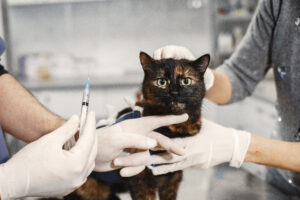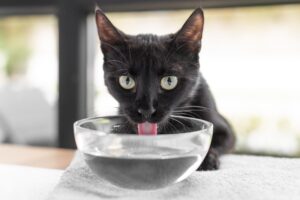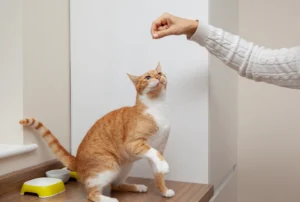Introduction
Every year, thousands of beautiful black cats wait in shelters across the United States, hoping for their forever homes. Yet despite their charm, intelligence, and loving nature, black cats often face longer shelter stays than their colorfully coated counterparts. Black cat adoption rates continue to lag behind other cats, creating a crisis in many animal shelters across the country.
Whether you’re considering a black cat adoption for the first time or are a seasoned pet parent, understanding the common mistakes people make when adopting these magnificent creatures can save you time, money, and heartache. More importantly, it can ensure that your black cat companion receives the love and care they truly deserve.
In this comprehensive guide, we’ll explore the five costly mistakes people frequently make when pursuing black cat adoption and provide expert advice on how to avoid them. From overlooking personality matches to falling prey to outdated superstitions, these missteps can impact both your wallet and your new furry friend’s well-being.
By the end of this article, you’ll be well-equipped with knowledge to make informed decisions about black cat adoption and ready to provide a loving home to one of these wonderful companions.
Understanding the Black Cat Adoption Crisis
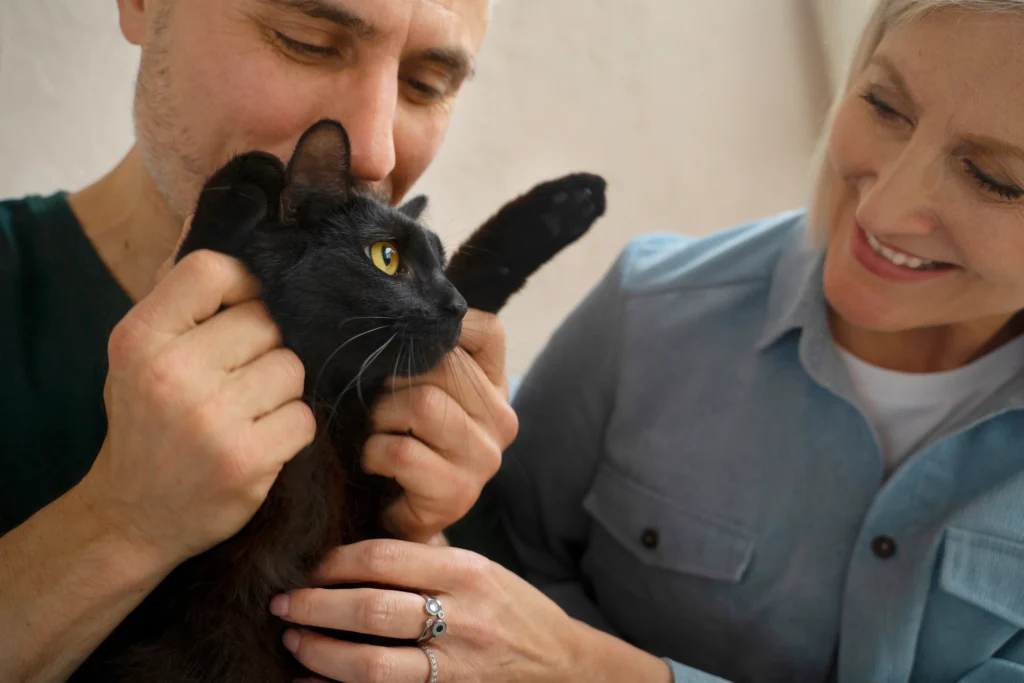
Before diving into common mistakes, it’s important to understand why black cat adoption is a pressing issue in animal welfare. Despite making up a large percentage of the shelter population, black cats often wait 20% longer to be adopted than cats with other coat colors.
The Statistics Behind Black Cat Adoption
Animal shelters across the United States report troubling statistics:
- Black cats have the lowest adoption rates and highest euthanasia rates among all cats in shelters
- During certain seasons, black cat adoption rates drop even further
- Many black cats for adoption near me (and likely near you too) have been waiting for homes twice as long as their colorful counterparts
- Black kitten adoption faces similar challenges, despite the general popularity of kittens
This crisis persists largely due to misconceptions, superstitions, and practical concerns that influence potential adopters’ decisions. Understanding these factors is the first step toward making informed choices when you decide to adopt a black cat.
Mistake #1: Falling for Myths and Superstitions About Black Cats
One of the most costly mistakes potential adopters make is allowing ancient superstitions to influence their decision about black cat adoption. These misconceptions not only limit adoption opportunities for deserving cats but can also lead to returned adoptions when unfounded fears aren’t realized.
Common Superstitions Affecting Black Cat Adoption
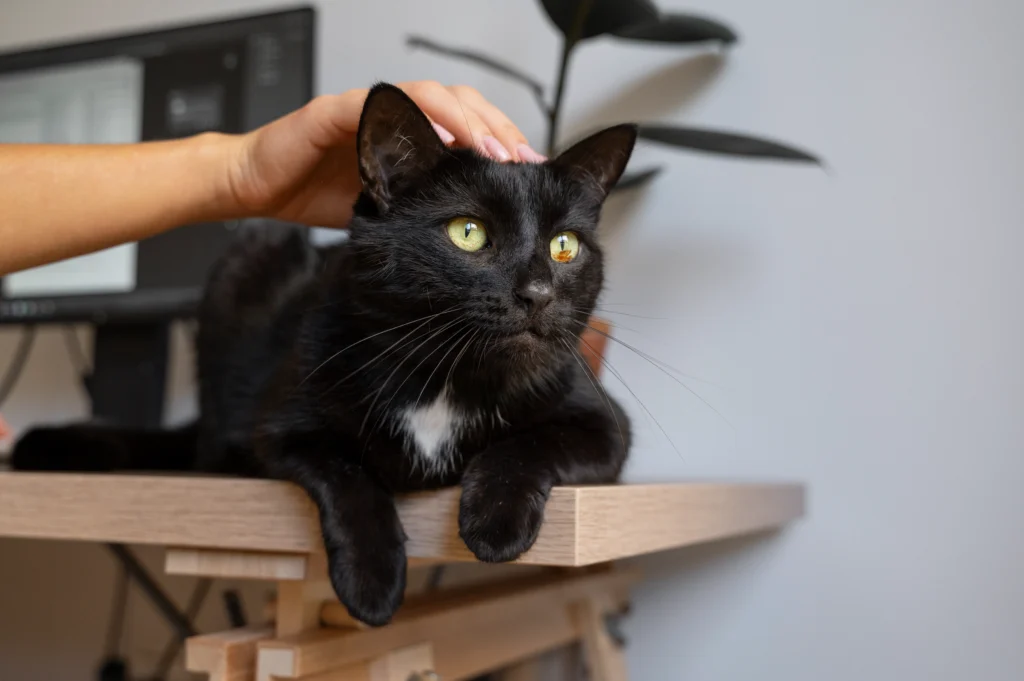
Throughout history, black cats have been both revered and feared. In ancient Egypt, black cats were worshipped as divine creatures bringing good fortune. Yet in medieval Europe, they became associated with witchcraft and bad luck.
Today, remnants of these superstitions continue to affect black cat adoption rates:
- The belief that black cats bring bad luck when crossing your path
- Associations with witchcraft and Halloween symbolism
- The notion that black cats are more aggressive or less friendly
- The superstition that black cats bring bad luck to the home
The Truth About Black Cats and Good Fortune
Contrary to negative superstitions, many cultures actually view black cats as symbols of good luck:
- In Japan, black cats are believed to attract potential suitors for single women
- British sailors historically welcomed black cats on ships as signs of good fortune at sea
- In many European countries, a black cat appearing at your doorstep is considered extremely lucky
- Modern research shows black cats often have gentle, affectionate temperaments
When considering black cat adoption, it’s important to recognize these myths for what they are—unfounded superstitions that needlessly reduce adoption rates for wonderful companions.
“The persistent mythology surrounding black cats has real-world consequences,” says Dr. Melissa Jenkins, veterinarian and animal welfare advocate. “Each year, thousands of loving black cats wait longer for homes simply because of the color of their fur.”
Mistake #2: Overlooking the Unique Personality of Black Cats
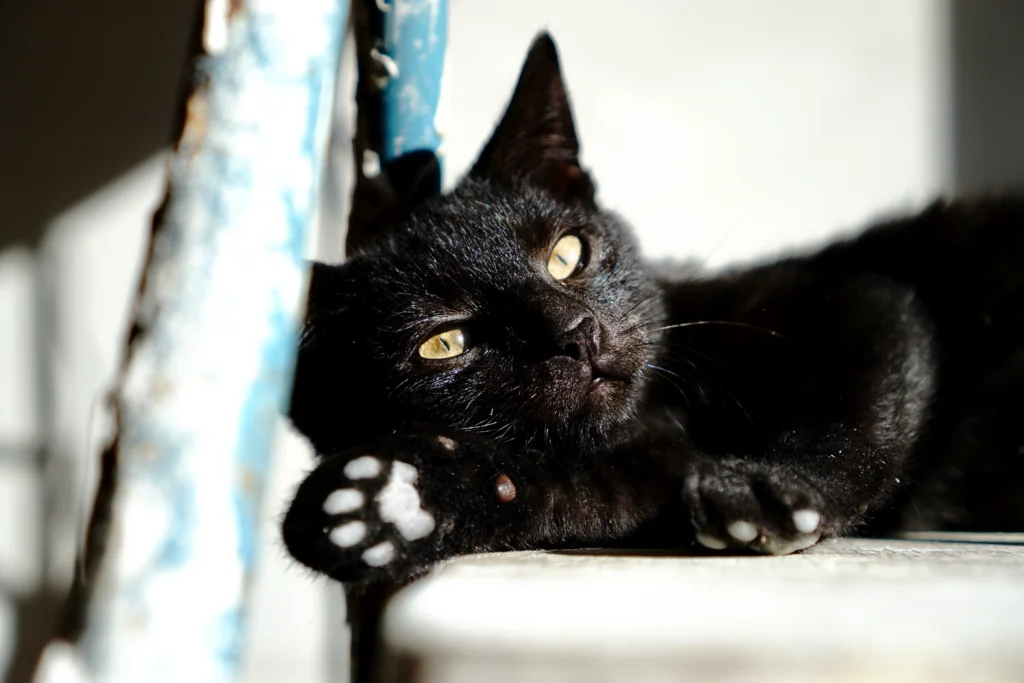
Another costly mistake in black cat adoption is treating all black cats as a monolithic group rather than as individuals with distinct personalities. This approach often leads to mismatched adoptions that don’t work out long-term.
The Diverse Personalities in Black Cat Adoption
Despite what some may believe, coat color has no scientifically proven correlation with personality. Just like humans, each cat—regardless of appearance—has its own unique temperament, preferences, and quirks. When you adopt a black cat, you’re adopting an individual with specific traits:
- Some black cats are outgoing social butterflies
- Others may be more reserved and independent
- Many black cats are playful and energetic
- Some prefer quiet companionship and gentle affection
Finding Your Perfect Black Cat Match
When visiting a black cat shelter or rescue organization, take time to interact with multiple cats. Many shelters now use personality assessment tools to help match adopters with compatible pets.
Ask yourself:
- Do you want an energetic playmate or a calm lap cat?
- Will your black cat share space with children or other pets?
- How much time will you spend at home with your new companion?
- What kind of enrichment can you provide for your cat?
The black cat personality that meshes well with your lifestyle will make for a much more successful adoption experience. Many black cats for adoption near me (and you) are waiting for someone who appreciates their unique personalities.
Mistake #3: Ignoring the True Costs of Black Cat Adoption
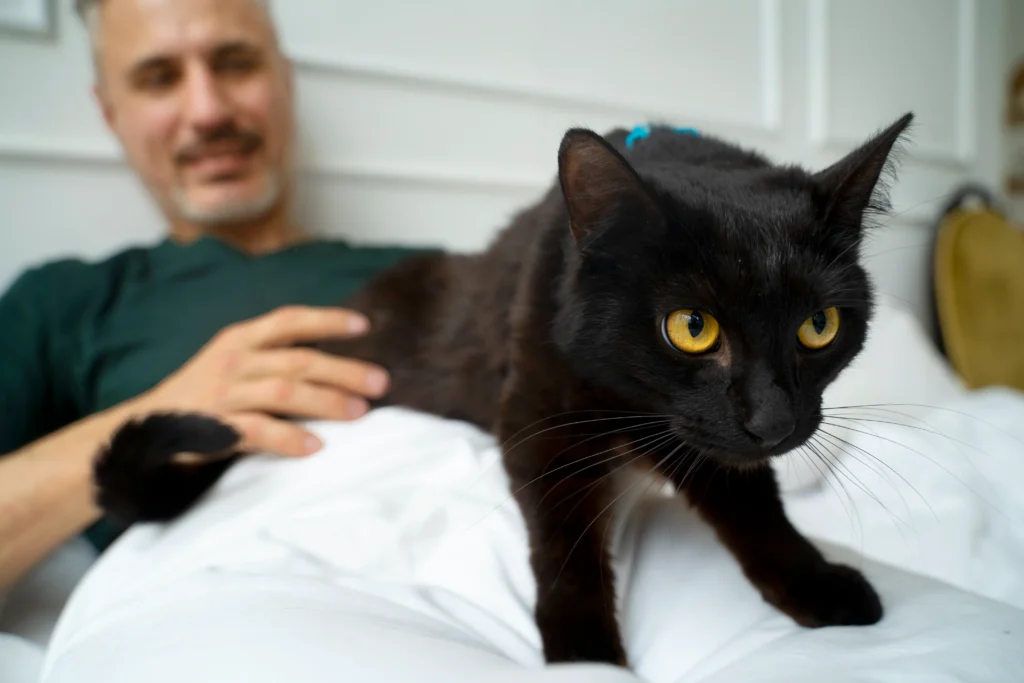
A significant error many people make when they decide to adopt a black cat is underestimating the financial commitment involved. While the initial black cat adoption fee might seem manageable, the lifetime costs of pet ownership can be substantial.
The Real Financial Picture of Adopting a Black Cat
When budgeting for black cat adoption, consider these expenses:
- Initial Costs:
- Adoption fees ($50-200)
- Initial veterinary exam ($50-100)
- Spay/neuter if not included in adoption ($200-500)
- Microchipping ($45-55)
- Basic supplies (litter box, carrier, scratching post): $100-250
- Annual Expenses:
- Routine veterinary care ($200-400)
- Food ($200-600 depending on quality)
- Litter ($100-250)
- Toys and enrichment ($50-100)
- Pet insurance ($100-300)
- Emergency Fund:
- Experts recommend setting aside $500-1,000 for unexpected veterinary emergencies
Cost-Saving Tips for Black Cat Adoption
While the expenses are real, there are ways to manage the costs of black cat adoption:
- Many black cat rescue organizations offer reduced adoption fees during special black cat adoption events
- Look for low-cost spay/neuter clinics in your area
- Consider pet insurance for unexpected medical expenses
- Buy supplies in bulk when on sale
- Create DIY toys and enrichment activities
Remember that adopting from a shelter often includes initial veterinary care, vaccinations, and spaying/neutering—services that would cost significantly more if purchased separately. This makes black cat adoption through shelters a cost-effective choice compared to other sources.
Mistake #4: Missing Seasonal Hazards Affecting Black Cat Safety
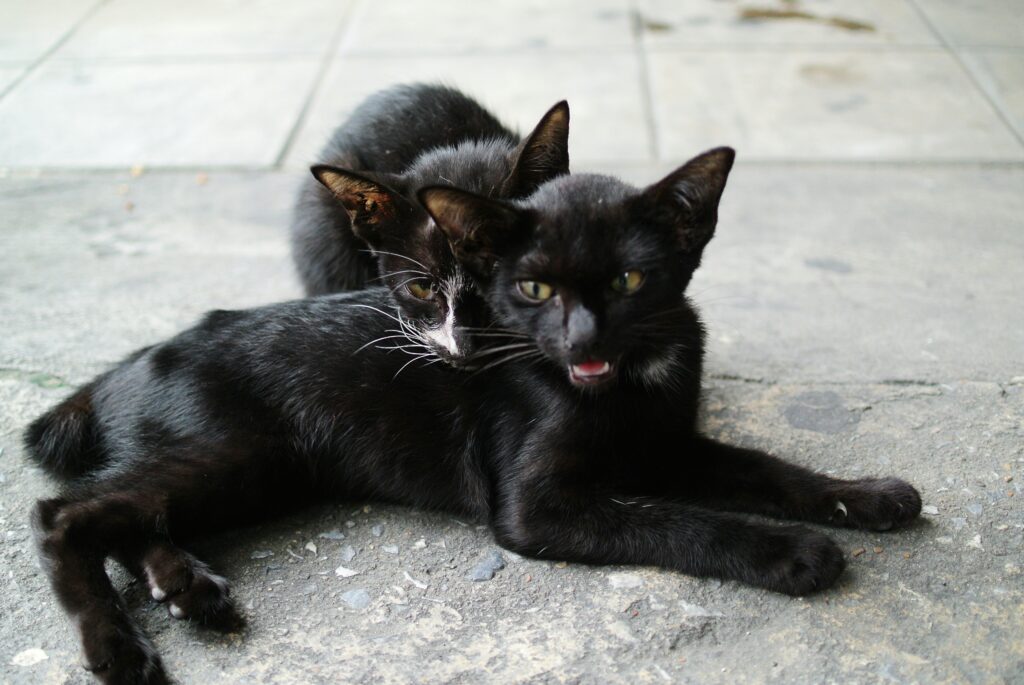
A potentially dangerous oversight in black cat adoption is failing to recognize the seasonal risks that disproportionately affect black cats, particularly around Halloween. Understanding these risks is essential for keeping your adopted companion safe.
Halloween and Black Cat Adoption Concerns
The connection between Halloween and black cats runs deep in popular culture, creating specific risks:
- Some shelters suspend black cat adoption around Halloween due to concerns about potential abuse
- Black cats may be at higher risk of being let outside as “decorations” or props
- Increased foot traffic and unusual costumes can stress cats unaccustomed to the commotion
- Certain Halloween decorations and treats can be toxic or dangerous to cats
Year-Round Safety Considerations for Black Cats
Beyond Halloween, black cat adoption comes with other safety considerations:
- Black cats can be less visible to drivers at night, making outdoor access particularly risky
- Their coloration makes them harder to find if they escape or get lost
- Some people may still harbor superstitions that put black cats at risk
When you adopt a black cat, committing to keeping them safely indoors (especially around Halloween) is one of the most important ways to protect your new family member. Creating a stimulating indoor environment with climbing opportunities, toys, and interactive play sessions can keep your black cat both safe and satisfied.
Mistake #5: Choosing the Wrong Adoption Source for Your Black Cat
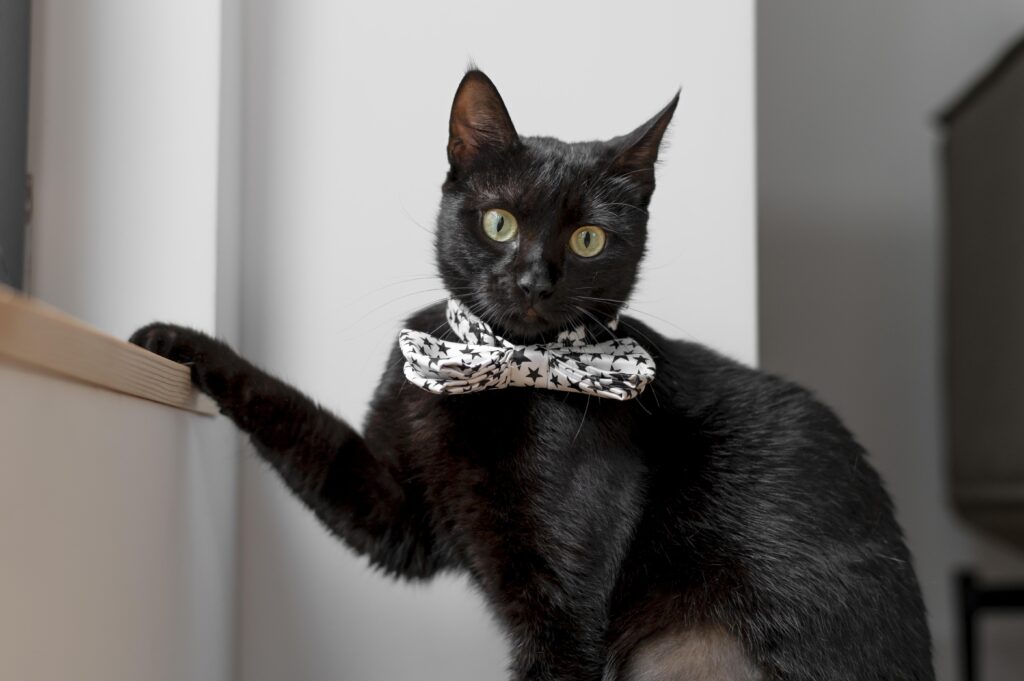
Perhaps one of the most consequential mistakes in black cat adoption is selecting an inappropriate or unethical source for your new pet. This decision affects not only the individual cat you adopt but also contributes to broader animal welfare issues.
Evaluating Black Cat Adoption Sources
When looking for black cats available for adoption, consider these options:
- Municipal Shelters:
- Often have the highest euthanasia risk, making adoption life-saving
- Lower adoption fees ($50-100)
- Basic veterinary care usually included
- Limited knowledge of cats’ background and behavior
- Private Black Cat Rescue Organizations:
- Specialize in black cat adoption and understanding their needs
- More comprehensive behavioral assessments
- Foster-based organizations provide insights into how cats behave in homes
- Usually higher adoption fees ($100-200) but include more services
- General Animal Rescue Groups:
- May have black cats for adoption as part of their general population
- Often provide thorough veterinary care before adoption
- Typically screen adopters more carefully
- Unofficial Sources (Online Listings, Word-of-Mouth):
- Highest risk for both adopter and cat
- No guarantees of health, behavior assessment, or proper care
- May inadvertently support irresponsible breeding practices
Red Flags When Seeking Black Cat Adoption
When searching for “black cats for adoption near me,” watch for these warning signs:
- Extremely low or no adoption fees without proper screening
- Unwillingness to allow you to meet the cat before adoption
- No veterinary records or proof of vaccination/sterilization
- Pressure to decide quickly without time for consideration
- Refusal to take the cat back if the adoption doesn’t work out
Choosing a reputable rescue or shelter for your black cat adoption ensures that you’re not only getting a healthier pet but also supporting ethical animal welfare practices.
Why Adopt a Black Cat? Compelling Reasons
Despite the common mistakes we’ve outlined, there are numerous compelling reasons why black cat adoption is an excellent choice for many households. Understanding these benefits can help you make an informed decision and avoid the misconception that coat color determines a cat’s value.
The Scientific Advantages of Black Cat Genetics
Research has revealed some fascinating potential advantages to black cat adoption:
- Studies suggest the genetic mutation that causes black fur may provide some resistance to certain diseases
- Black cats may have evolved their coloration as a survival advantage
- Some evidence indicates black cats might have slightly more balanced temperaments on average
Practical Benefits of Black Cat Adoption
Beyond genetics, there are tangible benefits to adopting a black cat:
- Availability:
- With so many black cats for adoption near me (and you), you’ll have many options to find the perfect personality match
- Black cat shelters and rescues often offer reduced adoption fees
- Many black cats available for adoption have already lived in foster homes, providing insight into their behavior
- Appearance Benefits:
- Black fur shows less shedding on dark furniture and clothing
- Black cats’ fur doesn’t show dirt as readily as lighter-colored cats
- Their lustrous coats are often exceptionally soft and beautiful
- Black cats photograph beautifully in natural light when photographed properly
- Behavioral Observations:
- Many black cat adopters report highly affectionate, loyal companions
- Black cat personality traits often include playfulness and intelligence
- Their expressive eyes and faces make communication with humans particularly effective
The Emotional Reward of Black Cat Adoption
Perhaps the most compelling reason for black cat adoption is the special bond many adopters report:
“There’s something magical about the connection with a black cat,” says Maria Gonzalez, director of Black Cat Rescue Network. “The people who adopt our black cats often tell us they feel chosen—as if their cat recognized something special in them.”
When you adopt a black cat, you’re not just gaining a pet; you’re saving a life that might otherwise be overlooked. Many black cat adopters report an extra measure of gratitude from their feline companions, as if the cats somehow understand they were chosen specifically despite common prejudices.
How to Successfully Adopt a Black Cat
Now that we’ve explored the mistakes to avoid, let’s focus on the positive steps for successful black cat adoption. Following these guidelines can help ensure a smooth transition and happy life for both you and your new companion.
Preparing Your Home for Black Cat Adoption
Before bringing home your new black cat, prepare your space:
- Essential Supplies:
- Food and water dishes (preferably wide and shallow)
- High-quality cat food appropriate for age and health status
- Litter box and unscented litter (one more box than the number of cats you have)
- Comfortable bed or sleeping area
- Scratching posts and toys
- Hiding spots and elevated perches
- Safety Measures:
- Secure screens on all windows
- Remove or secure toxic plants and household chemicals
- Address potential hazards like exposed electrical cords
- Create a quiet “safe room” for the initial adjustment period
- Enrichment Planning:
- Interactive toys that stimulate hunting instincts
- Window perches for safe outdoor viewing
- Vertical space for climbing and exploring
- Puzzle feeders to engage their intelligence
Finding Black Cats for Adoption Near Me
When searching for “black cats for adoption near me,” consider:
- Local municipal animal shelters
- Private rescue organizations specializing in black cat adoption or cats in general
- Black cat adoption events in your community
- Online resources like Petfinder.com that allow you to search specifically for black cats
Many shelters feature black cat adoption promotions during “Black Cat Appreciation Day” (August 17th) or year-round “Black Cat Specials” with reduced fees specifically for these harder-to-place felines.
The Black Cat Adoption Process: What to Expect
The typical adoption process includes:
- Application:
- Completing an adoption questionnaire
- Providing personal and veterinary references
- Possible home check or virtual tour of your living space
- Meet and Greet:
- Spending time interacting with different black cats available for adoption
- Asking detailed questions about each cat’s personality and needs
- Possibly introducing resident pets to ensure compatibility
- Adoption:
- Reviewing and signing adoption contract
- Paying adoption fee
- Receiving medical records and care information
- Follow-up:
- Many rescues offer post-adoption support
- Potential check-ins to ensure the transition is going well
- Access to behavioral resources if needed
Special Considerations for Black Kitten Adoption
If you’re specifically interested in black kitten adoption, additional considerations apply:
- Kittens require more time, energy, and supervision than adult cats
- Consider adopting a pair of kittens to provide companionship and appropriate play outlets
- Budget for additional vaccinations and the spay/neuter procedure if not already completed
- Prepare for higher energy levels and more extensive training needs
Success Stories: Transformed Lives Through Black Cat Adoption
To truly understand the impact of black cat adoption, consider these inspiring stories from people who chose to open their homes to these often-overlooked felines.
From Shelter Shy to Home Confident
Sarah Thompson wasn’t specifically looking for a black cat when she visited her local shelter, but a quiet black cat named Shadow caught her attention:
“He was so shy at the shelter that most people walked right past his cage. When I sat quietly near him, he eventually came over and put his paw on my hand. That moment changed everything. Three years later, Shadow greets everyone who visits our home and has become the neighborhood favorite. Black cat adoption was the best decision I ever made.”
The Healing Power of Black Cat Companionship
Military veteran James Rodriguez found unexpected therapeutic benefits after his black cat adoption:
“After returning from deployment with PTSD, I struggled with anxiety and isolation. My therapist suggested a pet companion, and I found Luna at a black cat rescue event. There’s something deeply calming about her presence. She seems to sense when I’m having difficult days and stays close. Black cat adoption didn’t just give her a home—it helped give me back my life.”
Black Kitten Adoption: Growing Together
The Garcia family chose black kitten adoption after careful research:
“We wanted our children to learn about responsibility and compassion. We adopted two black kittens, Midnight and Onyx, from a local black cat shelter. Watching them grow and develop alongside our children has been remarkable. The kids take pride in caring for cats that might have been overlooked by others, and they’ve become passionate advocates for black cat adoption among their friends.”
These stories highlight the transformative power of black cat adoption—not just for the cats, but for the humans who welcome them into their lives.
Addressing Common Questions About Black Cat Adoption
As you consider black cat adoption, you may have questions about these distinctive felines. Here are expert answers to some of the most commonly asked questions.
Are Black Cats Friendly?
A persistent question from potential adopters is: “Are black cats friendly?” The answer is a resounding yes! Black cats display the same range of personalities as cats of any other color. Many black cat adopters report their companions are particularly affectionate, loyal, and sociable.
Dr. Samantha Warren, feline behavior specialist, explains: “There’s absolutely no scientific evidence linking coat color to personality traits in cats. The perception that black cats might be less friendly likely stems from their historical associations with superstition rather than actual behavioral differences.”
When you adopt a black cat, working with knowledgeable shelter staff to find one whose individual personality matches your household’s energy level and needs is far more important than any coat color considerations.
Do Black Cats Need Special Care?
Black cats require the same basic care as cats of any color, including:
- Nutritious diet appropriate for their age and health status
- Regular veterinary check-ups
- Mental and physical stimulation
- Safe indoor environment
- Dental care and grooming
One special consideration: Black cats can be harder to photograph well, so use natural lighting and avoid flash photography to capture their beauty properly!
How Can I Help Black Cats Beyond Adoption?
If you’re not ready for black cat adoption yourself, there are many ways to support black cats in need:
- Volunteer at local black cat shelters or rescue organizations
- Foster black cats to help them become more adoptable
- Donate to organizations specializing in black cat rescue
- Sponsor a black cat’s care until they find their forever home
- Share positive black cat adoption stories on social media
- Educate others about the benefits of adopting black cats
Every action, large or small, helps combat the persistent biases that make black cat adoption rates lower than they should be.
Conclusion: Making an Informed Black Cat Adoption Decision
Throughout this article, we’ve explored the common costly mistakes people make when considering black cat adoption and provided guidance on how to avoid them. By understanding the unique challenges and rewards of bringing a black cat into your life, you’re now equipped to make an informed decision that benefits both you and your potential feline companion.
Remember these key points as you consider black cat adoption:
- Black cats face longer shelter stays despite being just as loving and companionable as any other cat
- The personality match between you and your cat matters far more than coat color
- Understanding the true costs of pet ownership prevents financial surprises
- Black cats may need additional safety considerations, especially around Halloween
- Choosing a reputable adoption source ensures healthier, well-socialized companions
Whether you’re searching for “black cats for adoption near me” or specifically interested in black kitten adoption, remember that the color of a cat’s fur doesn’t determine their capacity for affection, playfulness, or companionship. What matters most is the bond you’ll form and the life you’ll share together.
By avoiding these common mistakes, you’ll be well-positioned to provide a loving forever home to a deserving black cat who might otherwise be overlooked. And in return, you’ll gain a loyal companion whose quiet presence brings joy, comfort, and perhaps even a touch of good fortune to your daily life.
Ready to take the next step in your black cat adoption journey? Visit our cat adoption page for more information about available cats and our adoption process.
Additional Resources for Black Cat Adoption
Local Black Cat Adoption Resources
- American Society for the Prevention of Cruelty to Animals (ASPCA)
- The Humane Society of the United States
- Best Friends Animal Society
- Black Cat Rescue
- Cat Adoption Team
Black Cat Care Guides
Black Cat Adoption Events
- Check our events calendar for upcoming black cat adoption events in your area



